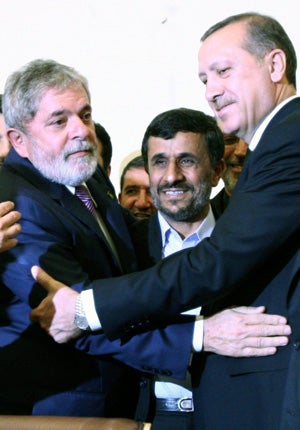US outflanked in bid to bring new sanctions against Iran
Turkey and Brazil say no more punishment is needed after brokering nuclear deal

Iran appeared to draw back yesterday from confrontation over its nuclear programme by agreeing to ship uranium abroad for enrichment, a move described by Western governments as being in the right direction but not enough to avert the threat of harsh UN sanctions.
Under the agreement, brokered by Brazil and Turkey, Iran agrees to send 1200kg of low-enriched uranium to Turkey for storage and will have the right after a year, to receive back 120kg of fuel enriched by Russia and China into rods for a Tehran-based medical research reactor.
If the deal is honoured, it would theoretically inhibit any Iranian plan to develop nuclear weapons. But the announcement risked undermining efforts by the US and its allies to bring China and Russia on board for a fourth round of punitive UN measures against Iran over the nuclear impasse. Moscow and Beijing have been reluctant partners in the debate over isolating Iran, a major trading partner to both.
Turkish Prime Minister Tayyip Erdogan and Brazil's president Luiz Inacio Luis da Silva, were in Tehran for the final hours of talks on the deal. Afterwards Mr Erdogan said: "My expectation is that after this declaration there will not be a need for sanctions."
Turkey and Brazil currently have seats in the UN Security Council, and thus votes on the decision on sanctions. Turkish Foreign Minister Ahmet Davutoglu held the deal as a "historic turning point" and claimed no further punitive measures against Tehran were necessary.
The Brazilian foreign minister Celso Amorim added: "I think that declaration... eliminates whatever doubts for sanctions against Iran. There is no ground to keep trying for new sanctions. The swap agreement should be the getaway for broader discussions."
Iran's President Mahmoud Ahmadinejad called on the Western powers to hold new talks with his government "based on honesty, justice and mutual respect." He continued: "They should welcome the major event that took place in Tehran and distance themselves from the atmosphere of pressure and sanctions to create an opportunity for interaction and cooperation with Iran."
The agreement is similar to a UN-brokered draft deal mooted last October, which fell apart when Tehran withdrew at the last minute. However, the Western powers are concerned the latest version does not address successive UN resolutions on Iran's refusal to stop its enrichment programme and the demand that it demonstrates full transparenency about its past nuclear activities. In Washington, the White House issued a cautious statement stressing that sanctions remained on the table. While the transfer of uranium abroad could be "a positive step", Iran's parallel committment to continue enriching uranium to a level of 20 per cent remains in breach of its international obligations, said Robert Gibbs, White House spokesman.
"The United States will continue to work with our international partners, and through the United Nations Security Council, to make it clear to the Iranian government that it must demonstrate through deeds – and not simply words – its willingness to live up to international obligations or face consequences, including sanctions".
The State Department said it was seeking clarification on the agreement. US Admiral James Stavridis, Supreme Allied Commander, Europe, for Nato said the announcement was "encouraging". But he said there were "a million miles to go" before Iran could be said to be complying with the wishes of the international community.
Bernard Kouchner, the French Foreign Minister, said the drive for new santions would continue although "some important progress" had been made on the matter. In Britain the Foreign Office minister Alistair Burt said Iran must involve the International Atomic Energy Agency in any export of nuclear fuel. "Until Iran takes concrete actions to meet those obligations, that work [on a new UN sanctions resolution] must continue."
Lula: the deal-maker
*Brazil's President, Luiz Inacio Lula da Silva, may have pulled off what has eluded Washington for years – a deal with Iran.
His growing influence in world affairs is naturally making some in Washington uneasy. Brazil has strong business ties with Tehran. Some in the US, however, welcome his expanding role.
"We are always saying we don't want to be the world's policeman," Wesley Clark, the former general and one-time US presidential hopeful, said last night. "So I think it's great that they step up."
He remains popular in Brazil even as his second and final term nears an end. This popularity is in part because of a perception that he has earned the country new-found clout on the world stage more commensurate with Brazil's size and growing economy. He won the 2016 Olympic Games, pushing aside a bid from the USA.
It may be the prospect of leaving office that is driving him and commentators note he wants Brazil to win its battle to secure a permanent seat on the United Nations Security Council. But also being muttered is his alleged ambition to become the next UN Secretary-General.
Join our commenting forum
Join thought-provoking conversations, follow other Independent readers and see their replies
Comments